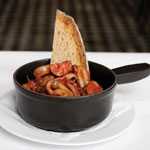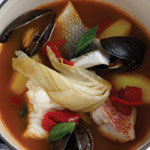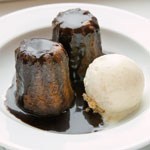An interview with Ollie Couillaud on the opening of Bord'eaux
After opening restaurants for some of London's leading chef-patrons, Frenchman Ollie Couillaud steps into the spotlight himself with Bord'eaux, a 160-seat brasserie in the Grosvenor House hotel. Joanna Wood gets the cook's tour
Ollie Couillaud is grinning like a Cheshire Cat as he takes me on a lightning tour of his new restaurant, Bord'eaux. He's so excited and anxious to show off every nook and cranny that the words are tumbling out of his mouth - but, unlike Lewis Carroll's creation, he's talking with lucidity. "Have you seen the deli? We've got a cellar where we're going to hold wine tastings… That's the private dining room… And that's going to be a seafood bar eventually… Here's the kitchen - not bad, is it?"
His excitement is understandable. The restaurant, a 160-seat brasserie in London's Grosvenor House hotel, has a massive window frontage on to Park Lane, London's most famous hotel strip, and embraces a small deli-café, too. It's a location most people would kill for but, even more crucially, it has given Couillaud his first opportunity to really assert his own culinary identity in the capital. Because, despite being an admired and respected chef on the London scene for well over a decade, he's always worked to achieve someone else's vision: whether that was Tom Aikens, for whom he opened Tom's Kitchen just over a year ago or Bruce Poole and Nigel Platts-Martin, for whom he opened La Trompette in Chiswick seven years ago.
Now, at Bord'eaux, Couillaud's culinary persona can take a turn in the spotlight - not only through the menu, but also through the design of the restaurant, which he's had a full say in even though the Grosvenor House has picked up the cost of refitting its former hotel dining room as part of an ongoing multimillion-pound refurbishment programme.
The deal, in case you're wondering, is that Couillaud operates Bord'eaux as a chef-patron completely independently of the hotel, and the Grosvenor House takes a percentage of the profit. How much, neither party will reveal.
If you're not familiar with Couillaud's background, the clue to his culinary identity lies in his home region of south-west France - hence the restaurant name - specifically in the Poitou-Charentes area, where his mother and aunt ran the family's Hôtel du Cheval Blanc et Clovis in the village of Vouillé for 40 years before handing over the business to his cousin.
On the decor front, this means that Bord'eaux is traditional French brasserie: lots of panelled mirrors and wood on the walls a tiled black-and-white central floor space long, room-dividing burgundy-hued banquettes white table linen and a fin-de-siècle scantily clad bronze lady hovering breezily near the reception desk. Think of a cross between London's Racine and the lofty grandeur of the capital's Wolseley and you'll be on the button.
Food-wise, Couillaud's soul is manifest in the honest, flavour-packed rusticity of his home region's classics, albeit presented with a bit of 21st-century flair and finesse. Dishes like grilled duck hearts and livers with chips and béarnaise sauce foie gras terrine with Pineau jelly sea bream with an olive oil mash and red pepper relish and, naturally, cassoulet. "It's almost like being a kid again for me, because all the stuff on the menu are things that I cooked as a boy with my mum and aunt," he says, before adding the confession that he had difficulty writing the menu in French. "I've been away from France for 16 years. These days I write in English, think in English and count in French. It was a big challenge and took me a long time."
Linguistic and numerical confusion, happily, don't translate to the menu, although Couillaud, sensibly, hasn't confined himself to just the Poitou or immediate Bordeaux hinterlands. That would have been far too limiting in culinary terms and a very difficult brief to work with for such a large brasserie. Instead, he's taken the stretch of country between the Loire valley just north of Poitou and the Spanish border to the south of Bordeaux as his inspirational basket.
This means that in addition to the duck, goose and meat influences of inland Dordogne and Gascony he's also got a huge maritime food tradition to play with. Scallops, Gironde caviar, mussels and various crustacea all have a place on the menu. And there are a lot of Basque touches, too: salt cod, a tapas platter, fish stew, lots of peppers and a French equivalent of the Spanish pata negra ham.
He's sitting down now - we've got 20 minutes to chat before he has to disappear for evening service - and I ask how he feels about the big-name competition he faces on Park Lane: the likes of Alain Ducasse, the Galvin brothers, Theo Randall and, of course, Richard Corrigan, who will soon be opening alongside Bord'eaux at the Grosvenor House.
"Competition is good. The more places to keep you on your toes the better. But we're also slightly different from the other guys on the strip because we're a brasserie. We're not top-end. Having said that, it will be a challenge, and consistency is going to be the key," he muses.
Another near-neighbour, Phil Howard of the Square in Bruton Street, for whom Couillaud once worked, thinks that Couillaud has as good a chance as any of his competitors of being a success. "I think there's a strong market at the moment for good brasserie food. And it's been proved time and again that if you give people what they want, then you'll be a success. Ollie's in his element with brasserie food. It's absolutely in his blood. It's his level of food - and I say that not because he can't do the more fine-dining stuff, but because it's what he gets off on."
Bruce Poole, Couillaud's former boss at La Trompette, concurs: "He's got a great understanding of classical and regional French cooking, because he grew up with it - and you can't replicate that experience. He knows how to run a restaurant, what makes a pleasant experience for people, and he's always been interested, like me, in doing very high-volume stuff really well. He likes the buzz. That's at least as difficult as doing a smaller, higher Michelin two- or three-star restaurant. It's quite hard to pull off."
Poole and Howard between them employed Couillaud for a total of 12 years - at the Square, Chez Bruce and La Trompette - and remain enduring role models for the modest Frenchman. Neither of these top chefs seeks the limelight, preferring instead to quietly get on with running their business, and Couillaud is of the same ilk. "I owe them a lot," he stresses, "and I wouldn't be here without them, or Nigel Platts-Martin [their business partner]."
Like his mentors, Couillaud engenders loyalty, and has managed to attract several former colleagues to work with him at Bord'eaux, chief among them being sommelier Thierry Sauvenot ("I keep sacking him and he keeps coming back!"), sous chef "the legendary" Paul Hallett (also known as "Paulie"), and pastry chef Raul Cintero, "the churros master" - all from Trompette days.
He's also kept links with suppliers from his past life - people like butcher Rodney Macken of Macken Brothers in Chiswick. Like all chefs, once you get Couillaud talking about his favourite suppliers, it's hard to shut him up. It's understandable, as a restaurant lives or dies by the quality of its raw produce, but Couillaud is particularly anxious to give his producers a slice of the action. So much so that he's planning to have pictures and details of four key suppliers included in Bord'eaux's press pack and, eventually, on the restaurant menu. It's a move that harks back to his days at Tom's Kitchen, which celebrates its bedrock produce in a similar way.
The mention of Tom's Kitchen brings a rueful smile to Couillaud's face because of that restaurant's high volume of covers put out by a relatively small brigade. "It was one of the hardest jobs I've ever done," he admits. "It was brutal - but I don't regret it for a second."
He left Tom's Kitchen in July 2007 after an approach from the Grosvenor House's general manager, Anthony Stewart-Moore. "The hotel wanted to do a brasserie, so I said ‘Let's do south-west.' Anthony introduced me to Henry Chabaane [of design consultants Blue Sky Hospitality], who's translated my ideas into reality. He's helped me a lot with branding and kept me on track when I got too crazy."
Chabaane - who has previously worked at the industry coalface with Bank and Vong - helped track down many of Bord'eaux's fittings and decorative accoutrements in Paris: things like the bronze lady, from a flea market, and the zinc bar top from a restaurant that was closing down. And he encouraged Couillaud in his search to stock the little deli-café with a number of exclusive French products. Bret's crisps, the grape-based Caudalie beauty products, Hédiard comptoir products, for instance, which sit alongside pastries and breads from the restaurant.
"It was always one of my dreams to have a shop next to a restaurant," enthuses Couillaud, who plans to sell things like terrines and pickles made in Bord'eaux's kitchens through the outlet. "We'll probably sell cured meat as well. We're going to do that on site, duck and lomo. Did I show you our rôtisserie in the kitchen? And our plancha - it's the best invention ever. And I forgot to tell you about the regional tapas we're doing at the bar, and the regional cocktails. Lillet (a bit like Chartreuse), Pousse Rapière (that's like a Gascon Kir Royale, only with an orange base in place of cassis), Floc de Gascogne (similar to Pineau des Charentes)…" He's off - I can't stop him. Indeed, his devotion to his new baby is infectious.
But there's one thing we need to get straight before he disappears behind his stove. Why that apostrophe in Bord'eaux? "Bord is the sea's edge, the coast, in French, and eau is water. There's a long coastline in south-west France. It's just emphasising that link." Of course.
Flavour-packed classic: grilled duck hearts and livers with chips and béarnaise sauce
Bord'eaux lowdown
- Chef-patron: Ollie Couillaud
- Where? Grosvenor House hotel, Park Lane, London W1K 7TN
- What is it? 160-seat brasserie, 12-seat private dining room, wine cellar/cave (can seat four if hired privately), café-deli (seating about 10)
- Open: Breakfast, lunch and dinner
- USP: Serving food and wines of south-west France - Bordeaux to the Spanish border
- Menu specialities: Grilled duck hearts and livers, andouillette, croque monsieur/madame, charcuterie (foie gras parfait, cured duck breast, lomo, saucisson), sea bream and olive mash
- Ethos: Value-for-money, tasty food. Couillaud: "I want people to feel that they can spend £5 or £50 and not feel uncomfortable."
- Restaurant vision: "I want to have the feel of La Tupina in Bordeaux. It's an amazing restaurant with all sorts of things going on."
- Kitchen brigade: 20
- Front-of-house brigade: 60
Recipes by Ollie Couillard
Ingredients (Serves 8-10 as a starter)
150g cooking chorizo
Olive oil
500g medium squid, sliced in rings
100g shallots, chopped
50g garlic, chopped
100g sun-dried tomatoes, diced
100g black pitted olives, sliced
100g green pitted olives, sliced
Splash of Jerez vinegar
Splash of fritada (Spanish tomato and red pepper sauce)
Lemon juice
Method
Cook the chorizo under a grill with a little olive oil and set aside. Heat a little oil to smoking point in a large frying pan. Fry the squid, ensuring it catches fire (this will achieve a lovely smoky flavour). Take out the squid and keep hot.
Turn down the heat. Add extra oil to the pan and cook the shallots, garlic, olives and tomatoes. Deglaze with the vinegar and add a splash of fritada. Return the squid to the pan. Slice the chorizo on a plate and add it with its cooking juices and a little lemon juice to finish.
Wine match 2005 Le Clos de l'Azerolle Vieilles Vignes Minervois: "A spicy, rich red which has a full body and is peppery enough to complement the chorizo perfectly. It is mainly composed of Grenache grapes." (£7.50 glass, £15 carafe, £22 bottle)
Ingredients (Serves four)
For the soup base (serves 10-20)
2 carrots
2 onions
1 stick celery
4 heads garlic
4 bay leaves
2 leeks
3 sprigs thyme
3 sprigs tarragon
3 sprigs rosemary
2tbs star anise
2tbs coriander seeds
2tbs fennel seeds
1/2 tin tomato paste
1/2 bottle Pernod
1/2 bottle Noilly Prat
1/2 bottle dry white wine
5kg white fish bones
10 litres water
1 tin peeled tomatoes
Lemon juice
Saffron, to taste
Splash of brandy, to taste
For the fish stew 175g red mullet
175g monkfish
175g sea bream
175g mussels
Sea salt
3 piments d'Espelettes
16 new potatoes
1 pinch saffron
1 bulb fennel, sliced
Olive oil
10 piquillo peppers
Aïoli, to serve
Method
To make the soup, fry off vegetables and herbs in olive oil, add tomato paste and cook out for five minutes. Add wines and reduce. Add fish bones, peeled tomatoes and water, bring to a boil and simmer for about three hours.
Put soup in a liquidiser and then pour it back into a pan on a low heat to reduce until the flavour has intensified. Finish with lemon juice, saffron, basil and brandy. Take the liquid off the heat, cover it with clingfilm and let the soup infuse for 10 minutes. Strain the liquid (about five litres) through a fine sieve and reserve to poach fish in.
To make the fish stew, season fish with salt and piments d'Espelette. Boil new potatoes in water coloured with saffron. Braise fennel in a little olive oil. Poach fish and mussels in the fish soup. Add the cooked new potatoes, braised, sliced fennel and piquillo peppers. Serve fish with a generous ladle of fish soup and aïoli on the side.
Wine match 2006 Vignerons du Pays Basque Irouléguy Xuri d'Ansa: "Dry, crisp and flowery and the perfect choice to complement the fish, as it is round and fruity. A typical example from the Basque, this is a good alternative to a Loire Valley wine." (£10 glass, £20 carafe, £29 bottle)
Ingredients (Serves five - two canelés per portion)
1 litre milk
100g butter
4 eggs
4 egg yolks
500g caster sugar
200g flour
100g rum
10 canelé moulds
For serving
Vanilla ice-cream and chocolate sauce
Method
In a saucepan, bring the milk and butter to 84°C, then mix with the rest of the ingredients. Leave for 24 hours in a fridge. Brush the moulds with beeswax and fill with the mixture. Cook in oven at 180°C for about 40 minutes. Remove the canelés from the moulds. Serve with vanilla ice-cream and warm chocolate sauce.
Wine match Pineau des Charentes Rosé: "This has hints of cinnamon, which complements the chocolate sauce. It is medium-to-dry, not too sweet the perfect match." (£5 per glass)
Cured duck breast
Ingredients
(Serves 10)
170g coarse salt
40 coriander seeds
20g star anis
3 cloves
40 peppercorns
16 bay leaves
3 cloves garlic
2 sprigs thyme
10 duck magrets
Method
Blend everything in a food processor except for thyme and duck. Pour the herb and spice mixture in to a bowl and coat all the duck breasts. Then stack them with thyme between each breast. Place a weight on top and leave the duck like this overnight. Then rinse each breast and hang them for five to six days in a well-ventilated room. When ready to serve, brush them with olive oil and serve thinly sliced.
Wine match 2004 Domaine Berthoumieu Haute Tradition Madiran: "A perfect choice, as it is rich, fruity and spicy and complements the flavoursome duck well. The wine is strong but not overpowering." (£8 glass, £16 carafe, £24 bottle)














